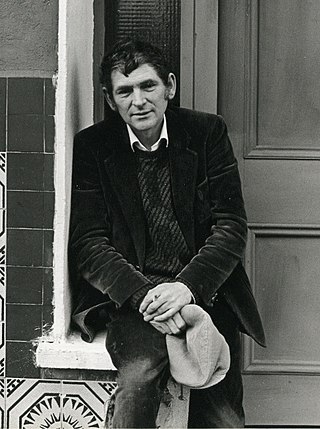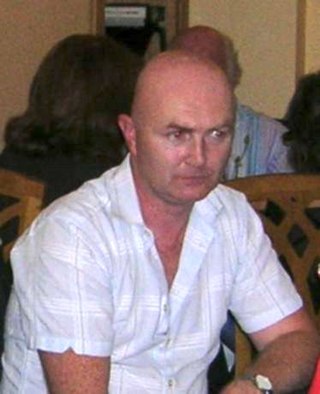
Irish poetry is poetry written by poets from Ireland, politically the Republic of Ireland and Northern Ireland today. It is mainly written in Irish, though some is in English, Scottish Gaelic and others in Hiberno-Latin. The complex interplay between the two main traditions, and between both of them and other poetries in English and Scottish Gaelic, has produced a body of work that is both rich in variety and difficult to categorise.
Thomas MacGreevy was a pivotal figure in the history of Irish literary modernism. A poet, he was also director of the National Gallery of Ireland from 1950 to 1963 and served on the first Irish Arts Council.
Maurice Scully was an Irish poet who worked in the modernist tradition. Scully was born in Dublin and educated at Trinity College. He was a member of Aosdana.

Michael Hartnett was an Irish poet who wrote in both English and Irish. He was one of the most significant voices in late 20th-century Irish writing and has been called "Munster's de facto poet laureate".

The Gentleman's Magazine was a monthly magazine founded in London, England, by Edward Cave in January 1731. It ran uninterrupted for almost 200 years, until 1922. It was the first to use the term magazine for a periodical. Samuel Johnson's first regular employment as a writer was with The Gentleman's Magazine.
The Irish Literary Revival was a flowering of Irish literary talent in the late 19th and early 20th century. It includes works of poetry, music, art, and literature.
Thomas Francis O'Rahilly was an Irish scholar of the Celtic languages, particularly in the fields of historical linguistics and Irish dialects. He was a member of the Royal Irish Academy and died in Dublin in 1953. He is the creator of O'Rahilly's historical model, which has a mixed legacy.

Ploughshares is an American literary journal established in 1971 by DeWitt Henry and Peter O'Malley in The Plough and Stars, an Irish pub in Cambridge, Massachusetts. Since 1989, Ploughshares has been based at Emerson College in Boston. Ploughshares publishes issues four times a year, two of which are guest-edited by a prominent writer who explores personal visions, aesthetics, and literary circles. Guest editors have been the recipients of Nobel and Pulitzer prizes, National Book Awards, MacArthur and Guggenheim fellowships, and numerous other honors. Ploughshares also publishes longform stories and essays, known as Ploughshares Solos, all of which are edited by the editor-in-chief, Ladette Randolph, and a literary blog, launched in 2009, which publishes critical and personal essays, interviews, and book reviews.
David Macleod Black is a South African-born Scottish poet and psychoanalyst. He is author of six collections of poetry and is included in British Poetry since 1945, Emergency Kit (Faber), Wild Reckoning, Twentieth Century Scottish Poetry (Faber) and many other anthologies. As a psychoanalyst he has published many professional papers, an edited volume on psychoanalysis and religion, and a collection of essays relating to values and science.
Hugh McFadden is an Irish poet, literary editor, lecturer and freelance journalist.
Classical Gaelic or Classical Irish was a shared literary form of Gaelic that was in use by poets in Scotland and Ireland from the 13th century to the 18th century.
The University of Wisconsin Press is a non-profit university press publishing peer-reviewed books and journals. It publishes work by scholars from the global academic community; works of fiction, memoir and poetry under its imprint, Terrace Books; and serves the citizens of Wisconsin by publishing important books about Wisconsin, the Upper Midwest, and the Great Lakes region.

John Jordan (1930–1988) was an Irish poet and short-story writer.
David Bottoms was an American poet.

The Association for Scottish Literary Studies (ASLS) is a Scottish educational charity, founded in 1970 to promote and support the teaching, study and writing of Scottish literature. Its founding members included the Scottish literary scholar Matthew McDiarmid (1914–1996). Originally based at the University of Aberdeen, it moved to its current home within the University of Glasgow in 1996. In November 2015, ASLS was allocated £40,000 by the Scottish Government to support its work providing teacher training and classroom resources for schools.
Scottish Gaelic literature refers to literary works composed in the Scottish Gaelic language, which is, like Irish and Manx, a member of the Goidelic branch of Celtic languages. Gaelic literature was also composed in Gàidhealtachd communities throughout the global Scottish diaspora where the language has been and is still spoken.

Susanna Roxman was an Anglophone writer, poet and critic born in Stockholm; her father’s family is Scottish. She was considered a gifted child. Her first few books were written in Swedish, but she switched over to English as her professional language. After having worked for some years as a secretary, a ballet teacher, and a fashion model, Roxman studied at Stockholm University, King’s College at London University, Lund University, and Gothenburg University, where she earned a Ph.D. in Comparative Literature. From 1996 to 2005 she headed the Centre of Classical Mythology at Lund University. She had several collections of poetry published, as well as literary criticism. Her poems have also appeared in literary magazines world-wide. Some of these pieces have been translated into Arabic and Persian. Roxman has taken part in many poetry readings, notably at the Edinburgh Festival.
Christopher Robert Agee is a poet, essayist, editor and publisher living in Ireland. He is the Founder and Editor of Irish Pages: A Journal of Contemporary Writing and of The Irish Pages Press/Cló An Mhíl Bhuí as well as the author of four books of poems, and one work of poetic non-fiction. He lives in Belfast, and divides his time between Ireland, Scotland and Croatia.

That part of the United Kingdom called Northern Ireland was created in 1922, with the partition of the island of Ireland. The majority of the population of Northern Ireland wanted to remain within the United Kingdom. Most of these were the Protestant descendants of settlers from Great Britain.

John William Sexton is an Irish poet, short-story writer, radio script-writer and children's novelist. He also writes under the pseudonyms of Sex W. Johnston and Jack Brae Curtingstall.









